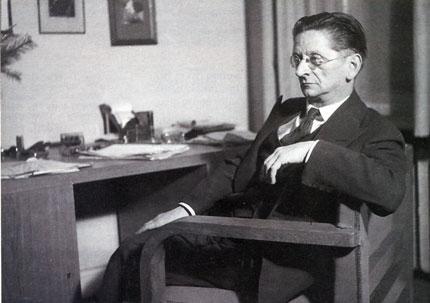The great thing about the paucity of Mahler compositions is that, when anniversary time comes, his late-Romantic buddies get to join in. And some of them, like Alexander Zemlinsky in his ravishing Lyric Symphony - being given a rare outing by the London Philharmonic Orchestra last night - sometimes seem to be better at Mahler than Mahler.
The Lyric Symphony is cast in the mould of Das lied von der Erde, a symphony with voices, with an Oriental text. There is also a similarity in the musical arc of the two works, both of which begin boldly and end in blissful resignation. Differences, however, there are refreshingly many. The symphony is configured in seven movements with soprano and baritone taking each verse in turn, while its text spends a lot of its time in a hazy heightened realism, and rarely finds its knickers (unlike Das lied) in a philosophical twist.
Relaying the fantasies and realities of a fleeting and perhaps illicit relationship, the work resembles an attractive little fin-de-siècle opera. Most of it seems to take place in a melted reality, a slippery subconscious soup. Hard edges are swept aside or transfigured into emotional musical supernovas.
A vocally punishing opening was tackled with great confidence by Thomas Hampson, as you'd expect from a master Mahlerian. Melanie Diener took longer to make herself heard and noticed in her heart-skipping song, her refined voice weaving in and out of sensual chromatic slippages and splashing around in puddles of glissando-ing celesta, glockenspiel and harp. Colour control in this work is much more Ravel, Bartók or Prokofiev than Mahler.
The third movement, Du bist die abendwolke ("You are the evening cloud"), reminded me of a Hindemith slow movement: everything is fried in a hot pan of high strings. The run-off - a kind of quiet but potent vat of boiling chip fat - remains as a drone through the next four movements, in which instruments fizz, bubble and burst to the surface angrily.
There are passages which seem to cry out for the psychoanalyst's couch. "Free me from your spells, and give me back/ the manhood..." reads the Rabindranath Tagore poem just as the orchestra begins to spray (on cymbal) and spurt (on brass). The end was ravishingly resolved by conductor Vladimir Jurowski: a beautiful musical evocation of one of those sunless reconciliations after a night of break-up.
There was an echo, or shadow even, of these night-time dalliances in the opening UK premiere of Peter Eötvös's Shadows. Amplified flute (Sue Thomas) and clarinet (Nicholas Carpenter) stand (sandwiched between celesta and drum) in the centre, surrounded by a not so amicable, not so hostile reduced orchestra. This is a taciturn, nostalgic work. It seemed frightened of doing anything too memorable or new and sympathy quickly waned. I'm not sure the amplifications added much, except expense.
Wedged in between these two (whatever one thought of them specifically) rather soulful works was a fun pub-piano performance of the Liszt Second Piano Concerto from Alexander Markovich. There was a part of me that thought that Alexander Markovich - whose belly was so substantial he could have used it as a third hand - should have his own TV show. The audience and I lapped up the way he manoeuvred his bulk around the keyboard, splashily, musically and with the unalloyed joy of a five-year-old, and then bounced back onstage with a big grin on his face to hurtle through Godowsky's transcription of The Skater's Waltz, hanging around the piano during the applause, like some flirty teenage girl, desperate to play us one more encore. It was not to be.
This was as far away from the classy Stephen Hough performance of Liszt's First last week as you could get. But horses for courses. And last night, this horse wanted that course.
- See the rest of the London Philharmonic Orchestra season
- See the rest of the 2011 Southbank Centre season














Add comment